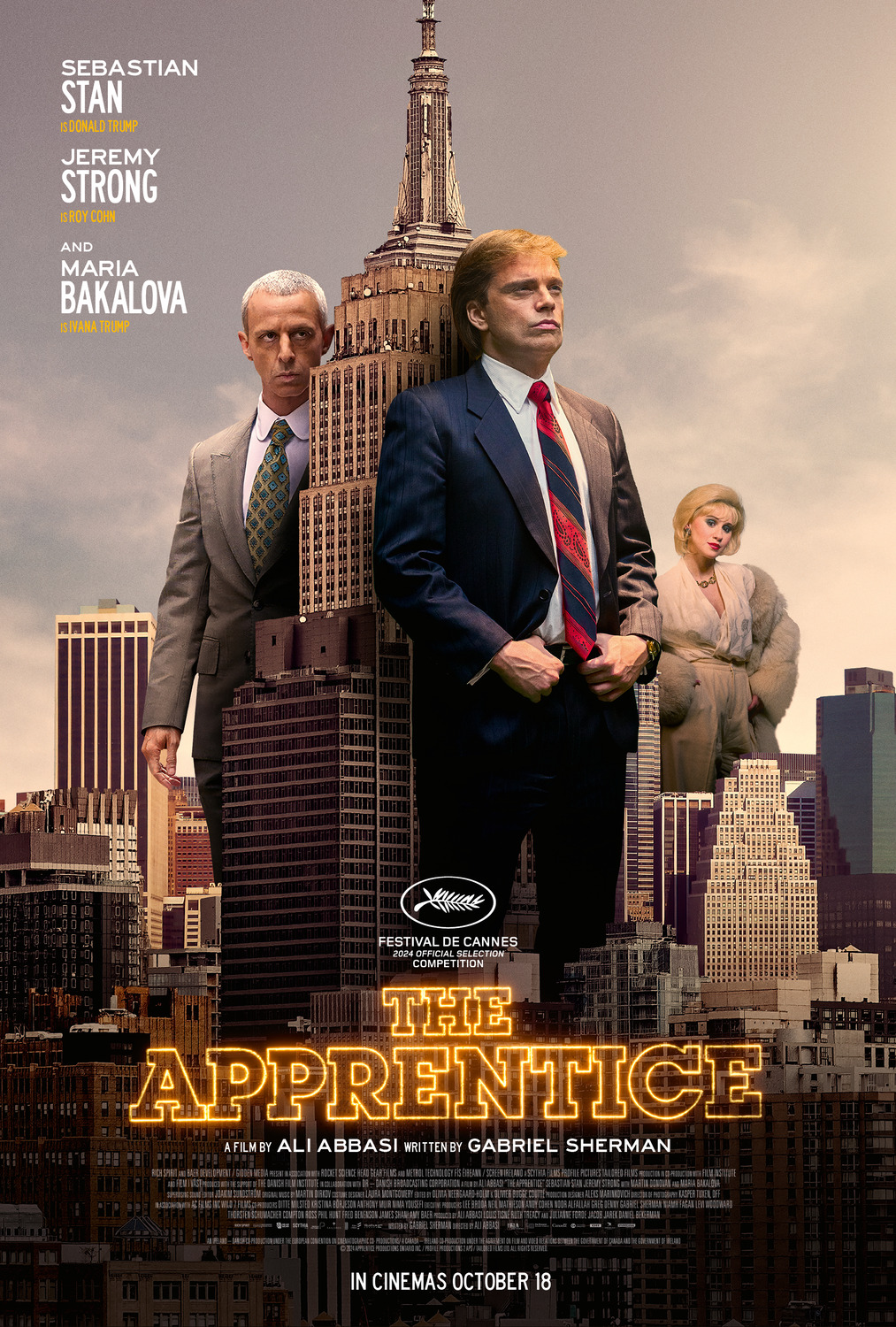Director
Ali Abbasi
Starring
Sebastian Stan
Jeremy Strong
Maria Bakalova
Charting the rise of Donald Trump [Stan], we witness the young entrepreneur’s first, formative meeting with notorious attorney Roy Cohn [Strong] in the early 70s. From this point, Trump absorbs all of Cohn’s questionable tactics and methods, helping him achieve the signature real estate developments that would make him a celebrity. Leveraging Cohn’s connections and doubling-down on the approach to corruption and blackmail, Trump begins to expand too rapidly, and quickly becomes embroiled in multiple legal battles.
One of the most bewitching and transportive choices Abbasi makes is to not opt for a glossy sheen to this film’s presentation. Spanning a decade from the early 70s to the mid 80s, New York is a rundown, dangerous, shell of a place. The interiors are framed by dark corners and the streets are overrun with trash and the effects of poverty. And to emulate the documentary-style footage of the time, everything is voyeuristically shot akin to something like The French Connection or the erratic, over the shoulder nature of a news report. And this immersion is heightened as the cinematography evolves from grainy 16mm, giving way to the horizontal strobing (almost VHS dropout) of the 80s. Is it an accurate representation of how that time period looked? Not necessarily but like the beach landing in Saving Private Ryan or the golden farmlands of O Brother, Where Art Thou? it taps into an emotional connection with the past. And the cap to top it all off is Martin Dirkov’s beautiful ominous synth heavy score – setting the scene by moving from funk to post new wave and then electronic, but always returning to the sombre gothic droning of Roy and Donald’s leitmotifs; adding a sense of funereal wistlessness to the proceedings.
When it comes down to the narrative study itself, there’s an almost lamentable tragedy to the whole thing. Donald is constantly uncomfortable and desperate to be taken seriously and approved of. Throughout the first half of the film, his plucky determination and brazen spur-of-the-moment decision making, could easily be recut and repackaged as endearing, noteworthy qualities. If you take his blossoming relationship with Ivana [Bakalova] for example: it feels earnest and sincere. He chases after her, makes grand gestures, and somewhat defenestrates himself to convince her to marry him. With a different score and a few edits, that could be presented as heartfelt integrity. It’s only in the movie’s second half that the spoilt, arrogant truth comes to the surface and you realise that this man has little shame and will say or do anything in the moment to get what he wants. And seeing this transition is oddly crushing. Most prequels and origin stories fixate on small details of familiarity with an insistence that they are intensely significant. But in reality, it’s retroactive elevation. Not here. Throughout The Apprentice, the narcissism and ego we now know starts to manifest gradually, with a sense of creeping dread and foreboding.
But none of the film would work without a strong central performance. It wouldn’t be enough to offer up a caricature or snide pastiche – we’ve seen plenty of those over the years. Instead, Stan goes beyond impression, affecting the patterns and mannerisms to construct a portrayal that fortifies over time. In other words, the more you watch, the more the line begins to blur. It’s frankly masterful and with a growing list of accolades and eyebrow-raising roles, Stan is quietly cementing himself as a notable talent who can take on seemingly any project. Conversely, Jeremy Strong and Maria Bakalova have the task of presenting figures who we may be aware of but have less immediate knowledge. On the one hand, there’s the terrifying intensity of the unscrupulous Cohn, which Strong brings to life magnificently. And on the other, you have the human warmth of Ivana whose presence in Donald’s life descends lauded and loved to abused and neglected. But, as with all biopics, there are liberties taken and interesting subplots and minor supports that feel somewhat neglected. And while Strong and Bakalova standout while on-screen, their arcs seem to fall away quite quickly. Nowhere is that clearer, however, than charting the decline of Trump’s older brother Fred Jr. There are important glimpses and moments (one of which I’ll highlight later) but they never feel fleshed out enough. Granted, this could be an intentional choice – opting to illustrate how, whenever something or someone (be it a debt, lawsuit, or confident) is not staring Trump in the face, it’s not even on his mind.
In truth, what could have been a hackneyed teardown, is in fact a surprisingly fair take. The Apprentice is less hit-job and more a crushing look at a man adrift. It successfully humanises its target while simultaneously outlining the monster he is. Admittedly, it’s also not going to change minds. There are those so deep in the cult, that they will never watch this film, and anyone who despises the former President, will feel it didn’t go far enough. But this balance is so important to avoid undermining the message at its heart: namely that there’s a Shakespearean self-inflicted tragedy at play but one that doesn’t excuse any of the deplorable actions he has committed. Instead, stripping Trump down, dismissing the moustache twirling cartoon villain, and revealing the surprisingly pathetic manipulator that’s left. My main frustration is that by ending on the authoring of The Art Of The Deal is fine and arguably fitting, but it felt like we should have had a more powerful crescendo. I’m not saying we needed white text on black screens or possibly even a haunting Blackkklansman style closing montage but, emotionally and psychologically, there was an opportunity to land a powerful and disturbing gut-punch. Without it, The Apprentice concludes like the resolution of a first part. We know what comes next but, given the understated power of the characterisation and production, audiences may long to see more.
Release Date:
18 October 2024
The Scene To Look Out For:
Cinema and, to be frank, the majority of the 20th century, has given a warped impression of what male strength through grief looks like. To express loss, regret and shame isn’t considered noble or worthy. Instead you must bury your feelings and present a constant pillar of unwavering strength. This is, of course, nonsense, but it manifests so well in one short scene where Donald is grieving the death of his brother. Not only thanks to Stan’s painfully human performance but the all too relatable sight of Trump struggling to keep it together while actively pushing his wife away to maintain the strong man act.
Notable Characters:
As mentioned earlier, the central triangle of Trump, Ivana and Cohn is spectacular, but as the film progresses, there’s only room for one figure and the focus of that triangle distorts. As such, it’s hard to see past Sebastian Stan. His journey from shy, attention-starved mogul to depraved, unspooling despot is fantastic; even at the expense of character closure around him.
Highlighted Quote:
“Never admit defeat Donald. That’s how you win.”
In A Few Words:
“A curiously surgical examination that, unlike the man himself, largely opts for subtlety over spectacle.”
Total Score: 4/5

![The Red Right Hand Movie Reviews [Matthew Stogdon]](https://reviews.theredrighthand.co.uk/wp-content/uploads/2021/12/cropped-header1.png)



